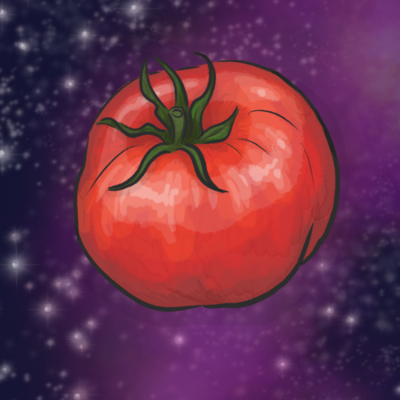No imagining of a futuristic utopia is complete without colonizing space.
But consider for a moment a freshly picked garden tomato, still warm from the summer sun. Compare that to your average supermarket tomato. One is heavenly; the other is, at best, uninspiring. Now think about how similar a garden tomato and a grocery store tomato really are. A grocery store tomato is what happens to a garden tomato when it must be grown and picked somewhere else on Earth. In order to make that short journey between a farm and a supermarket, it must sacrifice what makes it most dear – it is converted from the sublime to the most mundane by, at most, some 12,000 miles, or half the circumference of the Earth. This phenomenon is hardly unique to tomatoes.
Now consider getting a tomato to Mars. Mars is 130 million miles away. That is 11,000 times farther from the Earth than anything staying on Earth can be from where it started. That tomato sounds awful.
But not everyone likes tomatoes, so maybe we can send only people who don’t like tomatoes to Mars. Or better yet, maybe our enterprising Mars colonists can grow their own garden tomatoes in their own gardens. But will they be warm from the sun? Can they eat them while enjoying the afternoon breeze? Will they bring their own butterflies and hummingbirds to keep them company in the garden? Will the fruit be covered in dew in the morning?
For many years, I lived in Boston. In the summer, every Friday, there would be a miles-long traffic jam of people trying to leave the place we had collectively and purposefully built for ourselves to go to Cape Cod. No matter how much we love our cities, virtually everyone wants to get out of the city into nature, even when our cities are on Earth, where even the most urban places have much more in common with a sandy beach than anywhere else in the universe.
Add to that how easy it really is to build a city on Earth. Imagine all the complexities of building cities, then remove groundwater and breathable air. Even in the exceedingly unlikely scenario in which humans succeed in building a city as nice as Boston, but on Mars, it can never have a Cape Cod.
These denizens of New Boston will then presumably have children. As these children grow, they will learn that, in the home world, there are tomatoes fresh from vines, picked from plants that grew in the open air so freely in the native soil that gardeners had to continuously and methodically slaughter all other plants in the area. I imagine that in a place so hostile to life, the very idea of weeds would be not just foreign, but maybe even offensive.
They’d learn how in the summer – to them a meaningless concept outside the changes in daylight hours – their parents would sometimes take these fresh tomatoes to a beach, where they could swim in vast deposits of salty water covering three-quarters of the Earth, which was clean enough to even drink, though not particularly pleasant to do so.
Our society’s vision of an idealized future is one in which future generations of human beings will never really know a garden tomato. In our zeal for progress, we have forgotten that society exists to meet human needs, not the other way around. To advance society, we rely on growing the economy. Economists tell us that so long as the economy continues to grow, each generation will have a better life than that of their parents. To ensure progress, we must ensure growth, so we use as the primary measure for the health of our society the percentage by which the economy grows. Therefore, we must, in this way of thinking, necessarily outgrow our home planet. The economy cannot grow forever in a limited world. Progress means we are destined for the stars.
In this blog, I often say that technology is not progress, nor is it the main driver of progress. Today, instead of my usual criticism, for once, I propose an alternative. Progress isn’t going to space. It’s not AI, robots, or blockchain. Progress is like garden tomatoes but more and for everything.
Instead of GDP, I propose we measure annual garden tomato consumption as our main indicator of progress. That does not mean that we should fund a startup to build vast hydroponic warehouses that can grow and ship tomatoes via automated drones right to your door in a few hours. That misses the point. The point is the time and space to grow garden tomatoes. It’s the joy of watching them grow and of sharing them with your neighbors. It’s butterflies and hummingbirds. It’s a long and healthy life during which to enjoy many seasons of garden tomatoes.
GTP (Garden Tomato Production) is just the beginning. In time, we can expand this metric to home grown peaches, then maybe strawberries. From there, I hope we can add fresh leafy greens like spinach and lettuce, then move on to herbs like parsley and basil. Once we’ve established a robust garden-based metric, perhaps we can expand to annual books read, walks taken, and hours spent on porches. From there, we can start to count dinner parties, rounds of hide-and-seek, family reunions, campires, paintings made, songs sung, and dances danced.
Or maybe we can simplify this entire process. Instead of measuring the health of our society by how fast the economy is growing, why don’t we just ask ourselves if we’re happy? If we find ourselves as we do today at record unhappiness, even while the economy is growing, then maybe, just maybe, we’re doing it wrong.

